Semrush vs ahref
Disclosure
This post may include affiliate links, which means that if you purchase something after clicking on one of the links, we may receive a commission (at no additional cost to you). We do not accept payment for positive reviews, and all of our opinions are our own.

Semrush and Ahrefs are the two tools that dominate the SEO landscape. Additionally, they are two of my favourite SEO tools (along with GrowthBar for content SEO). As a result, this comparison will be far more difficult than the Semrush versus Moz comparison piece.
I utilise both of these technologies on a regular basis at my digital marketing agency, and if you have the budget, I recommend you do the same.
However, what if you just had funds for one all-purpose SEO tool?
Let’s face it: these are not inexpensive tools. Both of these tools will cost you over $200 per month. And that is if you choose the most basic package.
What if you only had the budget for one? Which of these two SEO tools would you choose? That is the question I will address in this post.

The following is a detailed comparison of Semrush and Ahrefs to assist you in determining which tool is a better fit for all of your SEO needs.
I’ll evaluate these two tools using the following six criteria:
- Keyword research
- Technical SEO audit
- Backlink analysis
- Position tracking
- Pricing plans
- Additional features
Without further ado, let’s compare Semrush seo tool with Ahrefs and see which tool comes out on top.
| Basic Plans (Comparison) | Semrush Pro | Ahrefs Lite |
|---|---|---|
| Pricing | $119.95/mo | $99/mo |
| Users Included | 1 | 1 |
| Projects | 3 | 5 |
| Total Pages to Crawl | 100,000 | 10,000 |
| Keywords to Track | 500 | 500 |
| Scheduled PDF Reports | 5 | NA |
| Social Profiles for Monitoring | 50 | NA |
| Trial | 1-Month Free | 1 Week for $7 |
KWFinder Review 2022 – Is It Worth It?
Semrush: Overview

An SEO and IT team formed in 2008 to provide a competitive research solution for internet marketing, and Semrush was born. A decade of experimentation and improvement has led Semrush to become the world’s leading digital marketing toolset, favoured by marketing specialists throughout the globe.
As a one-stop SEO shop, Semrush can help your site rise to the top of Google’s search results and leave your competition trailing in its wake.
In 2015, I began using Semrush website analysis to assist my clients with their search engine optimization needs. After signed up for free trials of numerous tools, I didn’t have a choice at the moment.

Adwords keyword data, to be honest, was all I had. Then I started getting into my Semrush account on a regular basis to search for keywords and competitors for my clients, and things began to change.
Quickly, it became my go-to tool for anything related to search engine optimization and pay per click advertising.
Initially a little trial, it’s now a lucrative investment that continues to pay off for the investor. Using Semrush report to gather data about the industry in general and my sites in specific is something I do on a daily basis.
Ahrefs: Overview

Ahrefs was started in 2010 as a tool to help people figure out how many links they have. Over time, the platform has become a tool that can help you with everything from a site audit to keyword research and more.
Ahrefs was still mostly known for its ability to look at backlinks. In order to use Ahrefs, I had to give up on Semrush’s backlink analysis tool because it didn’t give me enough information (which was still in beta stage at the time).
When I saw how easy it was to get data from Ahrefs, I was very interested. There’s also the sheer amount of backlink data for both your site and your competitors’ sites to take into account, too. Ahrefs was the only tool on the market that could do backlink analysis better than it.
There were many new features added to Ahrefs over time. Soon, it became a full-fledged SEO tool that can help you with more than just link-building. If you want to write a lot of content for your target keyword, you can use Keywords Explorer to come up with hundreds of ideas. You can also use the Site Audit feature to identify and solve problems with your site’s SEO.
Is it strong enough to take on the likes of Semrush, the undisputed king of search engine optimization? We’ll find out!
Check out Ahrefs Lite for a week at $7.
Now that you know a little about both of these tools, let’s go a little deeper and compare Semrush and Ahrefs in a more in-depth way.
Let’s do some research on keywords first, then.
Keyword Research: Semrush vs Ahrefs
Perhaps the most critical part of SEO is keyword research.
It enables you to have a more complete insight of your intended audience and how they locate your content or offers.
If you master the keyword research aspect of SEO, you’ll be able to create content for your website that is both user and search engine friendly.
As you’ll see shortly, both Semrush and Ahrefs offer impressive keyword research tools.
While Semrush was a pioneer in the field of keyword research, Ahrefs has made substantial advancements in the previous few years with Keywords Explorer, their primary keyword research tool.
Continue reading to learn which tool is superior for keyword research.
Semrush: Keyword Research
Semrush site audit tool is best recognised for its keyword research functionality. Apart from a sophisticated keyword research toolkit, best Semrush report is known for giving the most accurate search volume statistics, a critical indicator for both SEO and PPC operations.
When you type a keyword into the search box, you get your first peek of Semrush’s keyword research capabilities.
The Keyword Overview report summarises key keyword metrics such as monthly search traffic, keyword difficulty, CPC, PPC competition, top-ranking pages, keyword ad history, and ad copy.
However, if you want to delve deeper into Semrush keyword research skills, you’ll need the following tools:
- SEMrush Topic Research
- Keyword Magic Tool
Let’s begin by examining the Topic Research tool.
Topic Research enables you to produce a plethora of content ideas for any topic you enter. Subtopics include headlines, queries, and linked searches.
To begin, from your Semrush dashboard, navigate to Topic Research and type the topic or keyword(s) into the search box. To produce a list of sub – topics for your primary topic, click the “Get content ideas” button.

Cards with subtopics are how the content ideas are shown by default, but you can change this setting. Subtopics that are getting a lot of attention are marked with fire icons. These are the topics that have been the most talked about on the Internet in the last 60 days or so. toggle “Trending topics first” on in order to see the subtopics that are getting the most attention.
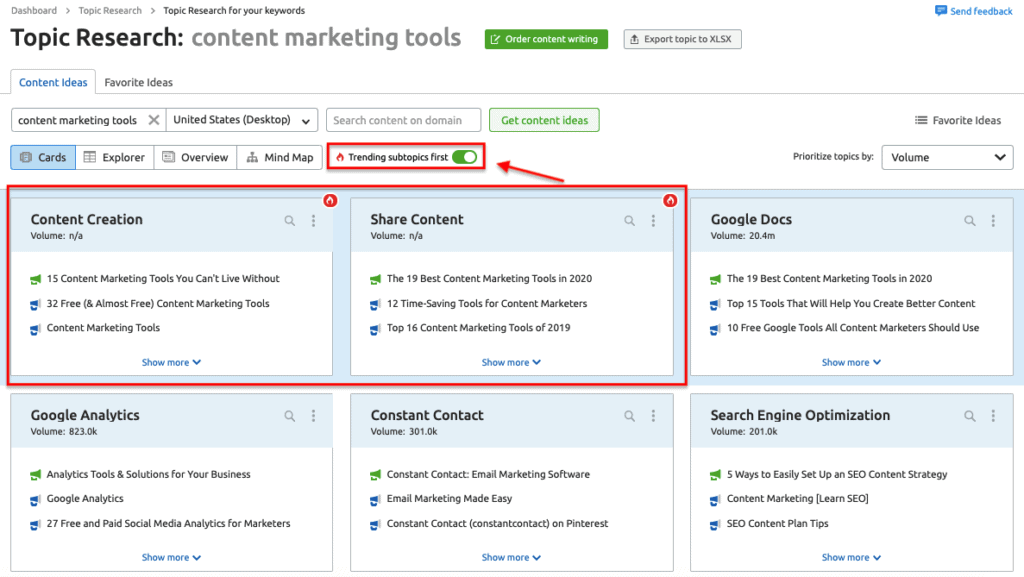
The topic cards can also be sorted by volume, difficulty, or topic efficiency.
You can click on any of these cards to learn more about the issue, including the most popular headlines, questions, and related searches.
Here’s a look at some of the popular subtopics that came up when I typed “content marketing tools” into the search engine:
You can’t go a day without these 15 content marketing tools.
a list of the best content marketing tools in 2020
For Content Marketers, 12 Time-Saving Tools
… as well as popular search terms like:
All Content Marketers Need to Use These 10 Google Tools!
Tools that will aid you in creating better content are on this list.
8 Content Marketing Tools to Make Your Life Easier
Using the semrush Topic Research tool, you can quickly identify the most popular topics on the internet. Semrush Topic Research should be your go-to tool if you ever need ideas for blog entries.
The semrush Keyword Magic Tool is the second keyword research tool available in the SEMrush toolbox.
Over 20 billion terms are supported by the tool’s 142 databases. Keyword Magic is a great resource for finding relevant keywords for your articles, as well as for optimising your content for the coveted highlighted snippets portion of the search engine results page.
After logging into your SEMrush account, follow these steps:
The semrush Keyword Magic Tool vs. Keyword Analytical Analysis
Hit “Search” after entering your seed keywords.
The tool will produce a list of keywords from your seed term that you can use in your article to help it rank higher in search results and increase the overall relevance of the article.
After that, you can refine your seed keyword’s results with modifiers like Broad Match, Phrase Match, Exact Match, or Related.
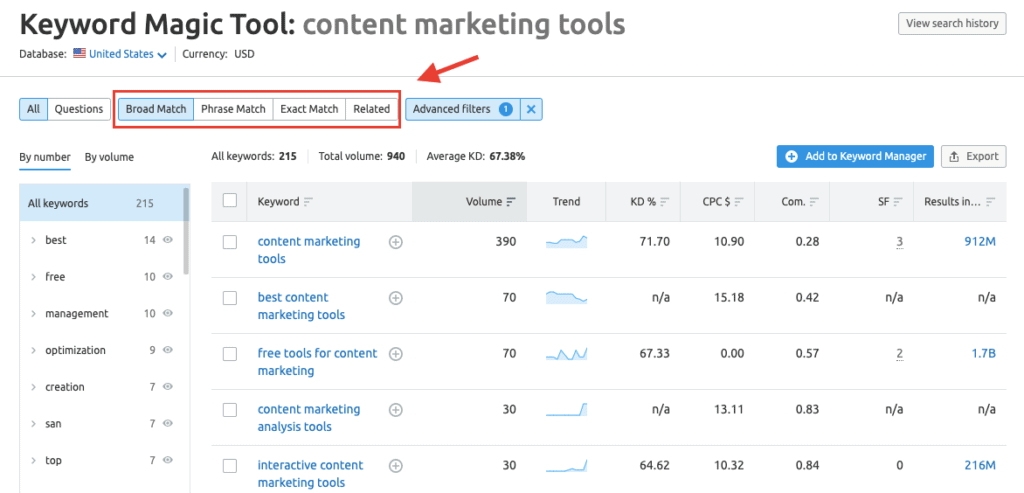
You can eliminate terms from your campaign that you know are irrelevant.
On the left side of the results page, you’ll notice keyword groups for your seed keywords, and you may omit keyword groups to more narrow down the phrases you’re targeting.
After identifying all of the keywords, you can import them immediately into Keyword Manager to gain additional information about the shortlisted keywords.
In short, Semrush’s Keyword Magic tool delivers a wealth of keyword data to assist you in developing SEO-friendly content that stands a good chance of ranking highly in search results.
Ahrefs: Keyword Research
With Ahrefs, you’ll do keyword research utilising the Keywords Explorer tool.
This tool allows you to produce thousands of keyword recommendations for your parent topic and view critical keyword metrics like as search traffic, keyword difficulty, and cost per click (CPC), as well as data on subtopics such as questions, similar keywords, and newly found keywords.
Allow me to demonstrate how Ahrefs Keywords Explorer works.
From your Ahrefs dashboard, navigate to the Keywords Explorer tab and type your keyword(s) into the search box, select the place you’d like to target, and click the search icon.
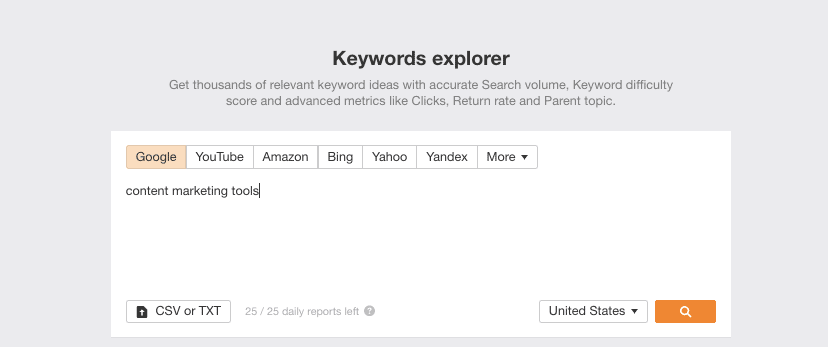
You’ll then be supplied with important data for the seed keyword(s) in addition to a list of keyword ideas for the seed keyword(s), along with the search volume for each keyword.

What makes Ahrefs truly special is that in addition to search volume for the target phrase, it also displays the clicks metric, which relates to the average monthly number of clicks made by users searching for the target term.
This is a critical indicator to track since some searches result in several clicks on multiple results, while others may result in no clicks at all. For instance, when we conduct a Google search for the age of a particular celebrity.
You may see the clicks metric for each keyword suggestion created from your seed term. At the bottom of the list, click “View all” to get the clicks metric as well as additional ahrefs keyword data for your target keywords.
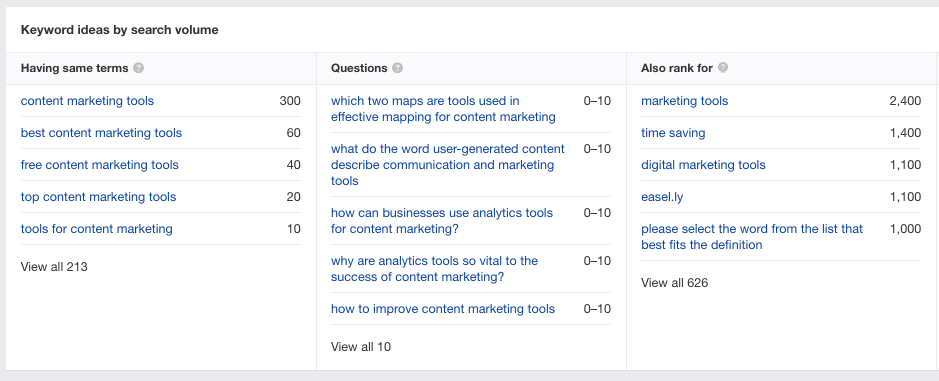
Which Keyword Research Tool Is the Best?
If we evaluate these tools just on the basis of their keyword research capabilities, Semrush dominates. That is not to imply that Ahrefs is a bad service. It’s just that SEMrush excels in keyword research.
In terms of keyword statistics, Ahrefs simply displays the search volume, keyword difficulty, clicks, and cost per click for your seed keywords. Beyond that, Semrush provides other keyword analytics like as competitive density, trend, and SERP characteristics.
Additionally, Semrush boasts the industry’s largest keyword database (20 billion keywords) – nearly double the size of Ahrefs’ database (10.2 billion keywords).
Another point in Semrush’s advantage is the precision with which search volume data is collected. After utilising both tools to improve keywords for my clients, I’ve found that SEMrush provides significantly more accurate search volume data for a broad range of phrases than Ahrefs.
Winner: Semrush
Backlink Analysis: Ahrefs vs Semrush
Links are one of the most difficult parts of SEO, but they are also one of the best parts. Backlink analysis helps you remain on course in the race to rank higher in search results pages. It helps you keep an eye on your own domain and your competitors.
a few years ago, Ahrefs would have been the clear winner when we were comparing tools for backlink analysis tools. But in the last few years, Semrush has made a lot of changes and advancements to their backlink analysis features, along with a new link index.
The question is, have they done enough just to start taking on the backlink analysis giant Ahrefs? We’ll find out.
Semrush: Backlink Analysis
It took a long time for Semrush’s Backlink Analytics tool to be the weak link in their SEO toolbox. When Semrush did a complete revamp and made a big increase in quality of their backlink data in 2019, that was the last thing we saw like this before then.

Using Semrush’s Backlink Analytics tool, you can get a wealth of information about your own and your competitors’ backlink profiles.
Enter your domain name into the search box on Semrush and click “Backlinks” from the drop-down option.
Your backlink profile will be summarised in a matter of seconds by Semrush, which includes the total number of backlinks and referring domain names.
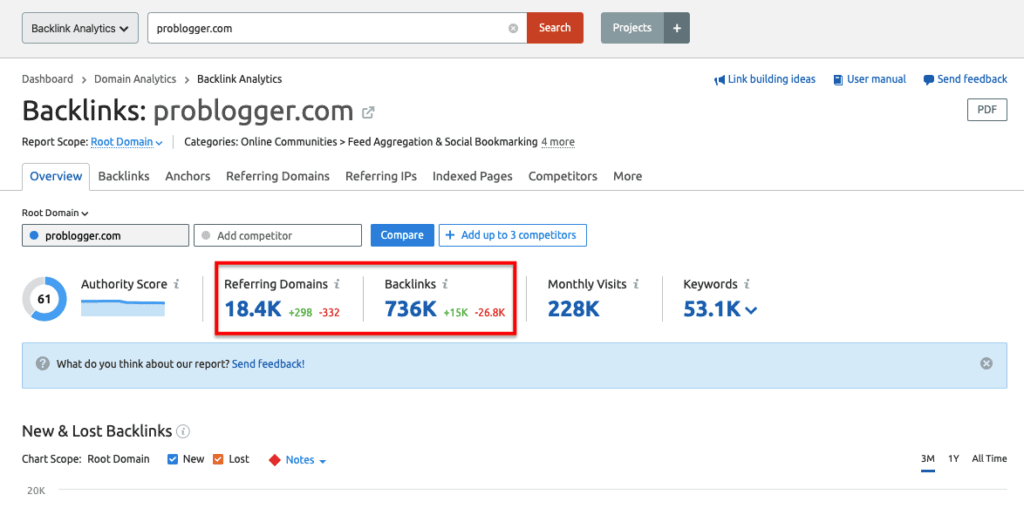
If you click on the total number of backlinks, you’ll be taken to the Backlinks report; if you click on the number of referring domains, you’ll be sent to the Referring Domains report.
There are many additional backlink indicators that you can view for your site including link qualities like dofollow/nofollow and top anchors as well as categories of incoming domains.
In the same way, you may learn a lot about the websites and link building techniques of your competitors. Your competitor’s website name is all you need to type into the search box to see their overall link profile as well as additional backlink statistics.
To illustrate, I utilised the blog of Darren Rowse, Problogger.com. There were 736k backlinks and 18.4k referring domains discovered by Semrush. Using Ahrefs’ Site Explorer, we’ll look at the same site again.
SEMrush’s Backlink Audit tool is another remarkable addition to its link development package.
To prevent Google penalties, this tool does a detailed analysis of your site’s backlink profile.
Disavow files can be sent to Google Search Console using the disavow tool. You’ll receive email warnings whenever questionable links are found on your website.
Building authoritative backlinks is just as crucial as disavowing bad connections.
Link building efforts might be undermined by toxic backlinks that disrupt your search engine rankings. A frequent backlink audit will ensure that your link profile remains healthy and free of questionable backlinks.
Ahrefs: Backlink Analysis
Ahrefs’ Site Explorer feature is where you’ll spend most of your time if you’re an Ahrefs user. In addition to providing vital search statistics, the Site Explorer tool provides a detailed examination of both your and your competitor’s link profile.
It’s easy to obtain an in-depth look at your site’s backlink profile by using Site Explorer from your Ahrefs dashboard.
The Overview report gives you a high-level picture of the website you’re examining. When it comes to backlink analysis, we’ll just be looking at two metrics: the number of referring domains and the number of links.
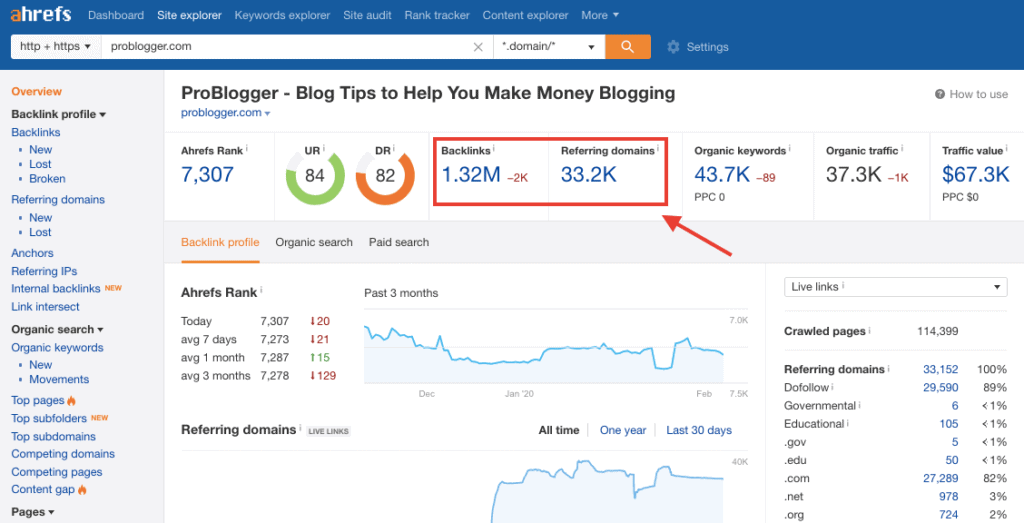
To learn more about the websites referring to yours, simply click on the number next to Referring domains or Backlinks.
You need the Referring domains report because it shows you which websites are backlinking to yours and how often they do so. In order to discover which sites are linking to your domain in a truly authoritative manner, pick “dofollow” from the link type drop-down menu and sort by domain authority.
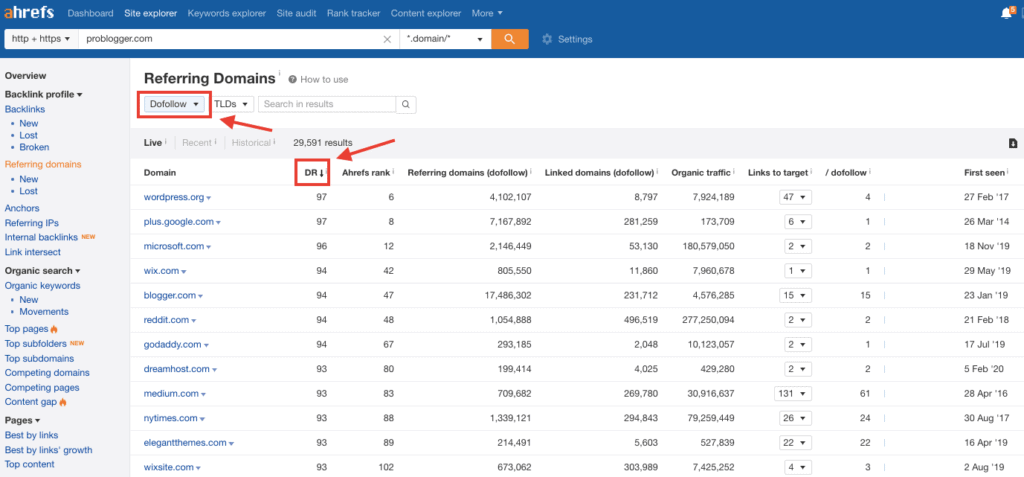
There are a number of ways to use Ahrefs’ Site Explorer to study the backlink profile of a certain URL. HubSpot’s best-performing page, for example:

A bigger link index suggests that Ahrefs has a larger link database. However, this isn’t always the case. SEMrush returned a higher number of referring websites and backlinks in some instances.
It is important to remember that although if Semrush claims to have a larger link database, we should not judge a backlink checker tool just on its link index.
Other criteria, including as accuracy and user interface, are just as crucial. Ahrefs has an advantage over Semrush and other backlink analysis tools because of these two characteristics.
Which Backlink Analysis Tool Is the Best?
In terms of link building features, Semrush is still lagging behind Ahrefs in the backlink analysis department.
Semrush has a larger link index, but Ahrefs is the obvious victor in this category because of its ease of use.
For a long time, backlink analysis was Semrush’s weak spot, although Ahrefs has always excelled at it. As a result of Ahrefs’ knowledge and competence in this field, they are able to develop faster and give users with an uncluttered UI that displays extensive backlink data.
Winner:Ahrefs
Technical SEO Audit: Semrush vs Ahrefs
Crawling, indexing, and rendering of your website are all aspects of technical SEO that should be improved in order to improve your website’s search engine rankings. As a result, it’s typically overlooked in favour of more exciting areas of SEO, such as keyword research and link development. However, it’s just as critical.
Your site’s technical SEO health can be affected by elements such as site structure, speed, robots.txt and SSL certificates, as well as XML sitemaps and more. Because of this, it is essential to do a technical SEO audit on a regular basis in order to discover and correct any technical SEO issues that may be preventing your website from ranking well in search results.
Now let’s see which tool is better at executing technical SEO audits than the others.
Semrush: Technical SEO
One of Semrush’s most frequently utilised products is the semrush Site Audit. Using this tool, you can do a thorough SEO audit of your site, as well as examine its overall health in terms of search engine optimization. Your site’s on-site problems are listed, and you are given recommendations on how to improve them so that your site ranks higher in search engine results pages (SERPs).
Using the semrush Site Audit tool, you can run over 130 checks for SEO issues, from simple on-page issues like title tags, h1 tags and meta descriptions all the way up to more complicated issues like hreflang conflicts inside page source code, format mistakes in sitemap.xml files, etc.
Create a new project in Semrush and pick the “Set up” button in the Project interface’s Site Audit block to begin an audit. The “Start Site Audit” button can be clicked here to begin the process.
You’ll get an assessment of your site’s SEO health from Semrush in a matter of minutes.
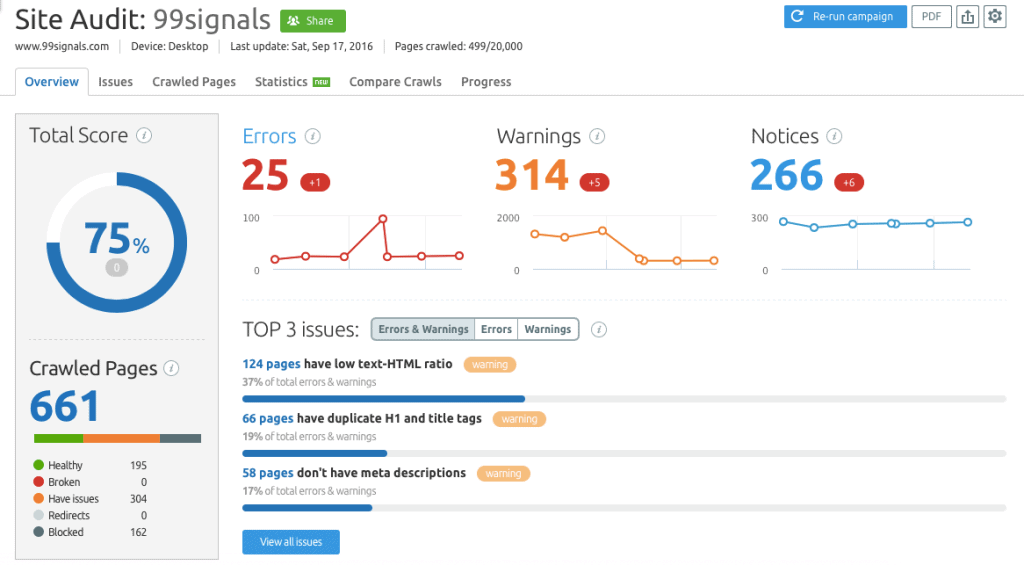
The website’s overall health score is calculated by dividing the number of issues discovered by the number of checks done. It is classed into Errors (the most serious), Warnings (the most serious), and Notices (the least serious) (less severe than Warnings).
You’ll find a list of the most critical issues from your audit underneath the errors, warnings, and notices. These issues are ranked according to their importance and the number of pages devoted to them, respectively. The Issues tab can be accessed by clicking on one of the buttons next to the issue. Detailed information on each problem and how to fix it may be found here.
You can run the Site Audit again to see if the errors and warnings have been resolved once and for all.
Ahrefs: Technical SEO
Ahrefs’ platform recently gained the Site Audit feature. There are over 100 predefined SEO concerns that the tool looks for as it crawls your website.
Upon completion, Ahrefs delivers an overall SEO health score, presents crucial data in charts, and shows all probable SEO issues with your site and provides tips on how to repair them.
After logging into your Ahrefs account, follow the steps below to do a site audit.
Site audit > New project > Enter your domain > Continue
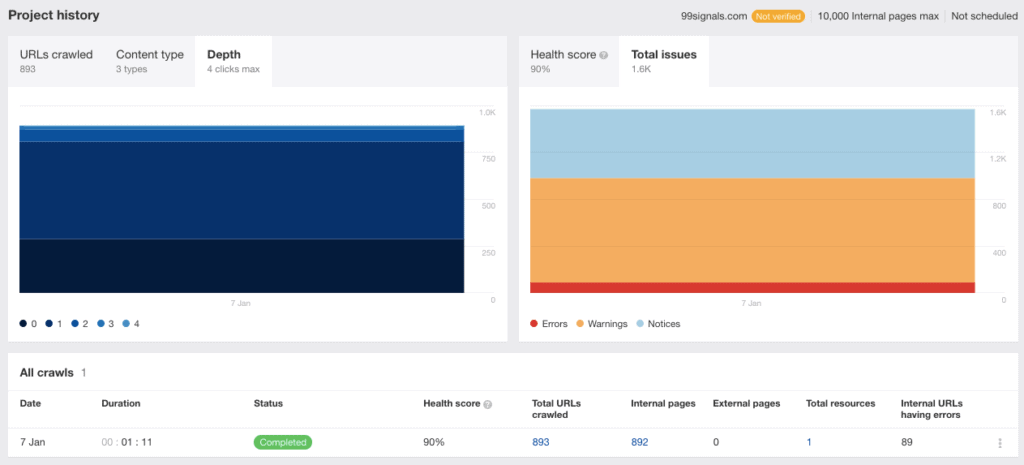
This gets me to my biggest complaint about the Site Audit tool: it takes forever for Ahrefs to crawl your website and search for probable technical SEO issues. Too much time is spent on it.
However small your site is, Ahrefs can take several hours to deliver an audit summary report. Once the site audit has been completed, you can log out of the dashboard and wait for an email alert from Ahrefs.
Which Tool is Better for Technical SEO Audit?
The Site Audit tool from Semrush comes out on top in this contest.
It takes a long time for Ahrefs to scan your website and provide an audit report, despite the fact that it does an excellent job of showing you the issues that are impacting your site’s SEO.
Apart from that, Semrush’s Site Audit tool has more functions and is easier to use as well as more accurate.
For example, Semrush has spent more time improving its Site Audit tool than Ahrefs and hence is better at discovering important on-site problems that are affecting your site’s search visibility.
Winner: Semrush
Pricing Plans: Semrush vs Ahrefs
For money, there isn’t a lot to choose from when it comes to Ahrefs and Semrush. Semrush and Ahrefs both have basic plans that cost $99.95/mo and $99/mo, which is about the same price.
With limits, Ahrefs has more restrictions on the free plan than Semrush has. Semrush lets you download up to 3,000 analytics reports per day, but Ahrefs lets you download only 25 keywords explorer reports and 50 content explorer reports per day.
Here’s a look at how both of these platforms charge.
When it comes to Semrush’s prices, there are a few different
In January 2021, Semrush raised their prices. This is how Semrush charges for its services now. If you switch to annual billing, you can save 16% on the total amount you owe for the year.

Ahrefs Pricing Plans
Ahrefs has a variety of monthly subscription options. By signing up for annual billing, you can save 20% on your total bill.
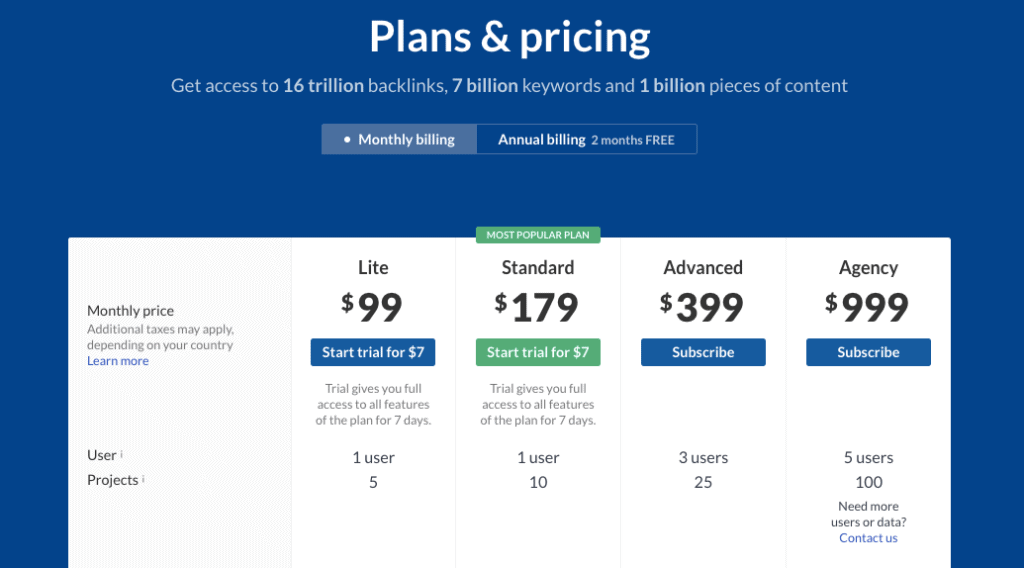
Ahrefs does not offer a free trial, as previously stated. For only $7, you may get access to any of their plans for the entire week.
Semrush’s basic pricing plan (PRO plan) is compared to Ahrefs’ basic pricing plan (Lite plan) in the table below:
| Basic Plans (Comparison) | Semrush Pro | Ahrefs Lite |
|---|---|---|
| Pricing | $119.95/mo | $99/mo |
| Users Included | 1 | 1 |
| Projects | 3 | 5 |
| Total Pages to Crawl | 100,000 | 10,000 |
| Keywords to Track | 500 | 500 |
| Scheduled PDF Reports | 5 | NA |
| Social Profiles for Monitoring | 50 | NA |
| Trial | 1-Month Free | 1 Week for $7 |
Semrush vs. Ahrefs: Final Thoughts

Finally, the decision between Semrush and Ahrefs as your favourite SEO tool is a matter of preference.
If link building and backlink analysis are your primary concerns at the moment, choose Ahrefs. Semrush, on the other hand, is a better choice if you prioritise keyword research, content marketing over link building, and technical
Having saying that, I would still recommend investing in both of these products if you have the means, as each has its own distinct set of capabilities.
However, if you just have funds for one, I’d choose Semrush over Ahrefs because it provides more value for money. And, as a result of the in-depth comparison analysis presented above, Semrush is deemed the superior SEO tool.
To summarise this discussion, below is a graphic comparison of Semrush and Ahrefs on key metrics: